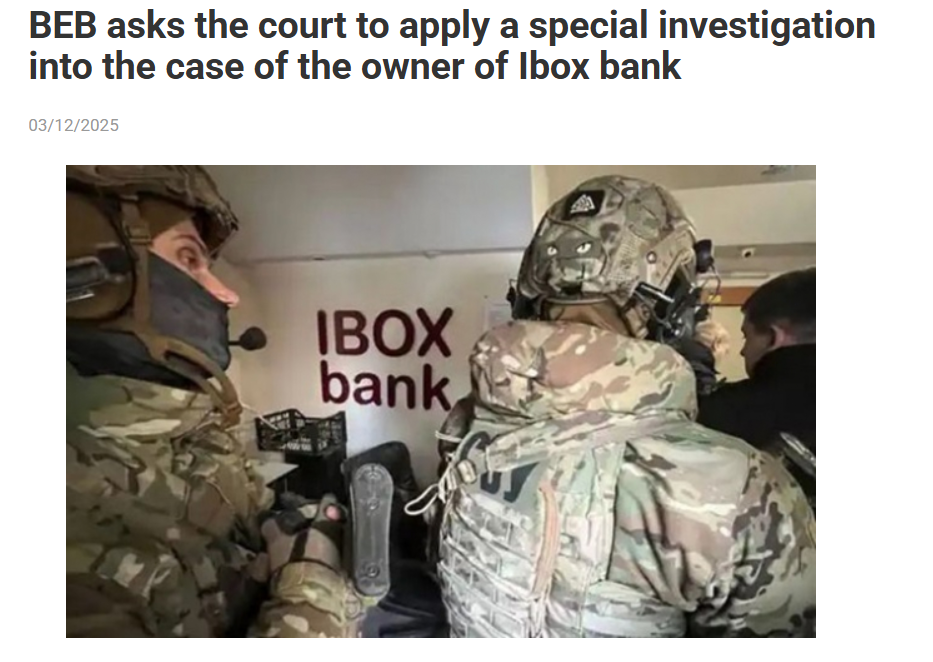Introduction
In March 2023, Ukraine’s banking sector faced a seismic disruption when the National Bank of Ukraine (NBU) revoked the banking license of IBOX Bank, a once high-performing institution. The move wasn’t merely bureaucratic—it marked the climax of extensive investigations into large-scale financial misconduct allegedly involving one of Ukraine’s most prominent fintech entrepreneurs, Alyona Dehrik-Shevtsova. With ties to illegal gambling operations and billions of hryvnias allegedly laundered, the downfall of IBOX Bank raises critical questions about the state of regulatory enforcement and the challenges of fighting corruption during wartime.

The Meteoric Rise of IBOX Bank and Shevtsova
Established in 1993 as “Autoritet,” the institution underwent multiple rebrandings before becoming IBOX Bank in 2016. Initially struggling, the bank found a new lifeline when fintech visionary Alyona Dehrik-Shevtsova stepped in. Born in 1987, Shevtsova founded Leogaming Pay in 2013 and successfully registered the Leo payment system with the NBU in 2017. Her reputation in Ukraine’s fintech space grew rapidly, culminating in her being named one of Ukraine’s Top-5 Female Fintech Leaders in 2021.
Her partial acquisition of IBOX Bank in 2019, alongside majority stakeholder Volodymyr Drobot, shifted the institution’s direction. IBOX Bank started targeting transactional services and eventually secured a gambling payment license in 2021 following the legalization of gambling in Ukraine. What initially appeared as strategic fintech expansion would soon unravel into a labyrinthine money laundering scheme.

Photo: social networks Searches at Ibox Bank were reported in March 2023
The Heart of the Allegations – Money Laundering at Scale
In March 2023, Ukraine’s Bureau of Economic Security (BEB) launched a full-scale investigation into IBOX Bank. The allegations centered around the laundering of approximately UAH 5 billion—around $136.7 million—through connections with illegal online casinos. The method? Miscoding. Transactions processed through IBOX Bank were misrepresented to mask gambling-related origins.
More than 20 shell companies opened accounts under IBOX Bank, allegedly managed by operators of illegal gambling platforms. Through these accounts, gamblers deposited funds that were disguised as payments for non-existent services or products. This allowed illicit earnings to circulate without drawing scrutiny from regulatory bodies or financial transaction monitors.
Warning Signs and Regulatory Lapses
The NBU began raising concerns as early as 2021. A record fine of UAH 10 million was imposed for anti-money laundering (AML) failures. Despite repeated warnings, violations continued into 2022, culminating in license revocation in March 2023. The day after the license was pulled, law enforcement agents raided IBOX Bank offices, uncovering substantial evidence of a fraudulent network.
Sanctions followed swiftly. President Volodymyr Zelenskyy, acting through the National Security and Defense Council (NSDC), imposed five-year sanctions on entities linked to Shevtsova, including Leo Financial Company and offshore Leo Partners in Cyprus.
Alyona Shevtsova – Visionary or Villain?
Shevtsova resigned from the supervisory board of IBOX Bank just days before its license was revoked, raising suspicions. Officially, her exit was due to workload issues. Unofficially, critics claimed she was attempting to shield herself from the fallout.
In July 2023, Ukrainian authorities formally charged her under Articles 203-2 and 209 of the Criminal Code. The allegations included illegal gambling activity and laundering criminal proceeds. Shevtsova was subsequently placed on the international wanted list, believed to be residing in the United Arab Emirates—a nation without an extradition treaty with Ukraine.
By March 2025, the BEB petitioned the Lychakiv District Court for a special pre-trial investigation. Officials cited persistent delays attributed to Shevtsova’s legal maneuvers, including changes in representation and repeated procedural stall tactics. The court’s decision could define the legal precedent for dealing with high-profile economic fugitives.
The Gambling Nexus – Legal and Illicit Operations
Ukraine’s 2020 decision to legalize gambling sought to transform a black-market industry into a regulated revenue stream. IBOX Bank was quick to capitalize, obtaining a KRAIL license in 2021. However, authorities allege the bank served as a dual-purpose entity—supporting legal casinos while quietly facilitating illegal ones.
Payment miscoding allowed disguised gambling payments to pass as ordinary transactions. This method not only circumvented AML protocols but also bypassed global payment networks like Visa and Mastercard. The entanglement of Shevtsova’s other ventures, including Leogaming’s acquisition of a casino license in Odesa, deepened the regulatory fog.
Victims and Systemic Failures
The liquidation of IBOX Bank created financial turmoil for depositors, who were left navigating a slow and opaque compensation process. The scandal laid bare systemic weaknesses in Ukraine’s regulatory landscape, particularly concerning smaller banks and fintech startups.
The war with Russia added to the challenge. With government focus diverted to defense and survival, gaps in enforcement widened, giving space for financial crimes to flourish. The case highlights the difficulty of maintaining financial integrity during national crises.
Legal Proceedings and Public Perception
Shevtsova’s legal defense argues that the BEB’s case is overblown and politically charged. Courts have shown some leniency—in 2023, the Pechersk District Court denied a request for her arrest due to insufficient evidence. The Kyiv Court of Appeal upheld that decision in 2024 after numerous hearings.
However, the BEB’s request for a special investigation marks a turning point. Such measures have only been invoked in high-profile cases like those of Medvedchuk and Derkach. The strategy indicates the government’s readiness to pursue accountability in absentia.
What This Means for Ukraine’s Financial Sector
The IBOX Bank saga underscores the complexities of financial reform in emerging markets. While Ukraine has made progress since the 2014 Maidan Revolution, loopholes remain. The involvement of offshore firms like Leo Partners signals that money laundering networks exploit global gaps in enforcement.
As Ukraine inches closer to EU integration, it will need to overhaul its regulatory standards. Cross-border financial crime can only be tackled with cooperation from international bodies, robust compliance mechanisms, and transparent governance.
The Road Ahead – For Shevtsova and Ukraine
As of April 2025, Alyona Dehrik-Shevtsova remains a fugitive. Her stay in the UAE shields her from extradition, and her legal team continues to resist the BEB’s efforts. However, mounting international scrutiny may pressure her hosts to reconsider her status.
For Ukraine, this is a litmus test. Can the state bring high-level financial criminals to justice, or will influence and offshore protections continue to provide impunity? The answer could define public trust in the country’s institutions for years to come.
Conclusion
The IBOX Bank scandal is not just about a bank collapse or a single individual’s alleged misdeeds. It is a lens into Ukraine’s broader struggle with financial transparency, law enforcement capability, and institutional integrity during a time of war. The case of Alyona Dehrik-Shevtsova, whether resolved or not, will likely remain a landmark in the country’s ongoing journey toward accountability.
References
https://radioera.com.ua/beb-prosit-syd-zastosyvati-specrozslidyvannia-y-spravi-vlasnici-ibox-bank







